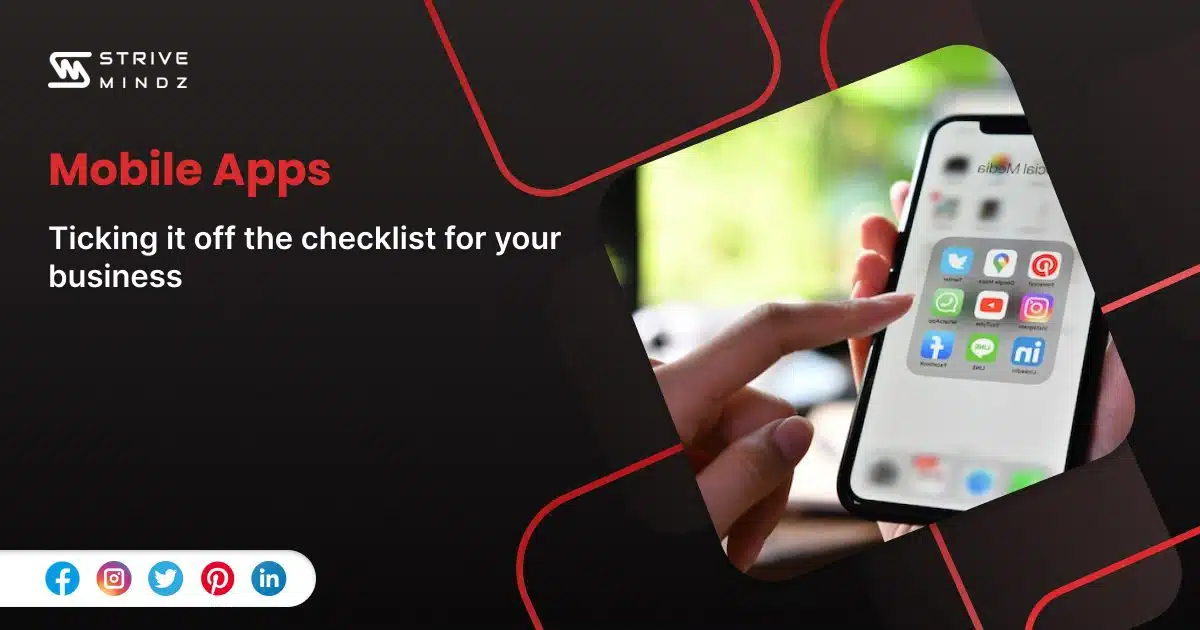Mobile Apps-Ticking It Off The Checklist For Your Business

In a contemporary era like ours that is delimited by technology, the rise or fall of a business is dictated by the extent of its presence on a digital platform. In line with this thought process, many businesses are opting to develop mobile apps for their businesses. There is nothing better than a mobile application to solidify the presence of a business in the digital space.
What are Mobile Apps?
They are commonly referred to as Mobile Applications and are software applications that are specifically designed to augment the experience of using a wireless smart device like a cell phone or tablet. Apps are compatible for use on these services and are far for accommodating and user-friendly when compared to the hassle of accessing and using a business website on these devices.
Apps may be Native Apps that come in-built with the device or Hybrid Apps that combine the competencies of a Website application and a Native App. As far as businesses are concerned, be it a large corporate or a small-scale endeavour, developing a hybrid app that integrates your website with the facilities available in a handheld device, is key.
Why is Developing a Mobile Apps Good for a Business?
First and foremost, if a user has the application on their device, it exponentially increases the chances of your brand getting recognition. Brand recognition is a major factor that pushes your business from the consideration level to the purchase level of the buying process. A mobile app also greatly improves visibility. The average smartphone user checks their phone every 12 minutes and 90% of that time is spent using apps. Around 60% of all digital media usage is attributed to apps. So, a mobile app is like a billboard you see over and over daily. And this is even if your app is not constantly used by the mobile user.

A major plus-point of apps is also the fact that they can engage customers better. If the customer is under the impression, that your app is the easier option, it keeps them interested. So, if you can engage better you engage longer. This can be a major factor that distinguishes you from your competition. If your business can provide the service with one click or step lesser than your biggest competition, you win. This also kindles customer loyalty.
Things to Keep in Mind While Developing a Mobile Apps
Now that you are sold on the idea of a mobile app for your business, you must consider making the app the right way, keeping some important factors in mind. The primary factors to consider are the goal and the purpose of your mobile apps. There must be a clarification about what the app intends to achieve. It can be to propagate the brand, to improve lead conversions for monetary benefits, etc. The app should be designed to facilitate whatever that goal is. Before launching your app on the Google Play Store or the App Store, a business owner must define the category the app will fall into. The category elucidates the purpose of the app. Some of the most popular categories are Gaming, Social Media and Tools.
Once a goal is set, a business has to identify the behavioural patterns of its target audience. For example, airlines mostly design their apps to engage customers when they introduce promotions. Their primary goal is customer loyalty and they are well aware that their customers will not use their PCs when it comes to tracking their frequent flyer miles or availing discounts.
A business must also track customer grievances and requirements. By understanding what your customer wants, you can develop mobile apps with features that other similar mobile apps may not be equipped with. Like in the case of a food-delivery app that delivers to customers on trains.
It is also advisable to integrate the technical team with the aforementioned activities. This would give them a clearer idea about how to go about formulating the app. This reduces bottlenecks. The mobile app development team will thus be able to choose the proper framework and plan the data delivery, device optimization, application program Interface, content management, scale, security, etc.
Managing a Mobile Apps Post-release
It is customary to release various functional versions of an application. The first of the iterations will have the basic features and subsequent versions will have prominent and differentiating features. A mobile app will at no point have a ‘final version’. The business can plan out the features to be added with each recapitulation well in advance but competitors and customer requisites will always keep you on your toes.
After the app is made available to users, one of the focal success-defining metrics is the number of downloads. Or it once was. If a user downloads the app and leaves it stagnant on their device, it ultimately defeats the purpose of the app. The end goal cannot be confined solely to the magnitude of downloads. Using the earlier analogy of a billboard, this situation for an application compares to a billboard that only contributes to brand recognition and not lead conversions. No business will have an end goal of only brand recognition, an application will have to yield monetary benefits at some point. This is where the significance of the terms ‘retention’ and ‘churn’ come in. A stagnant app will not have sufficient devices to retain customers and will lead to users ‘churning’. If the mobile app is redundant it will be deleted.
One way to avoid churning is to keep consumers engaged with notifications and app updates that are relevant to them. Food delivery apps now have a ‘premium’ feature that gives the customer great offers and discounts for a small fee. This allows them to entice customers, get monetary benefits and also retain customers with their app.
Read Also: The Top 10 Mobile App Development Frameworks to Watch in 2023
Conclusion
The size or the scope of a business is irrelevant when it comes to contemplating the requirement of an app. Apps are beneficial to everyone, provided proper research and planning go into the app development and execution.
Making sure an app yields the necessary outcomes and accomplishes the set goals is a continuous process but a return on investment of both time and money is guaranteed.
